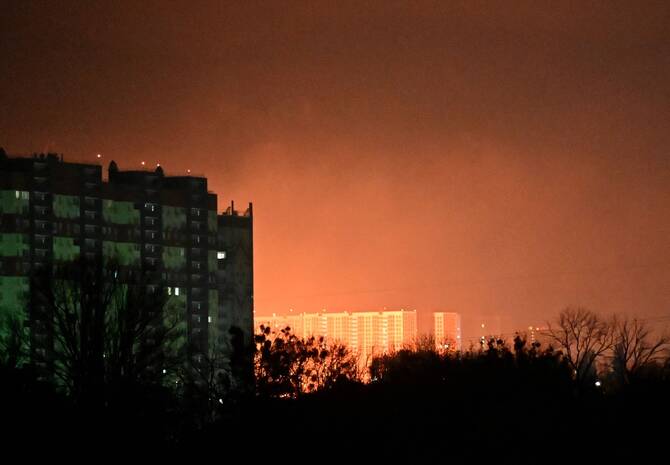“Destructive” windstorms that raged across central and northern Pakistan after an intense heatwave have killed at least 14 people and injured over 100 more, officials said Sunday.
Fierce winds, thunder and lightning swept across eastern Punjab and northwestern Khyber-Pakhtunkhwa provinces as well as the capital Islamabad on Saturday afternoon and evening, uprooting trees and downing electric poles.
While the majority of the deaths were caused by collapsing walls and roofs, at least two people died after being hit by solar panels dislodged by the whipping gusts.
One man was killed and three others were injured by lightning strikes.
Mazhar Hussain, a spokesperson for the Punjab provincial disaster management authority, told AFP that such windstorms develop because of excessive heat, which reached above 45 degrees Celsius (113 degrees Fahrenheit) in recent days.
“There were three to four days in the recent heatwave where temperatures went up quite a lot,” he said, announcing 14 deaths in Punjab and 100 injured.
“This windstorm was particularly destructive. The wind speed was very high. There was so much dust in it that visibility was greatly reduced.”
The Pakistan Meteorological Department predicted more storms on Sunday.
Social media was replete on Saturday evening with videos of the damage the windstorms had unleashed.
A clip filmed inside a plane about to land in Punjab’s city of Lahore showed passengers screaming in terror as the aircraft was tossed about by turbulence.
The plane was later diverted to Karachi.
Other videos show cars crushed by falling trees and roads blocked by debris.
Pakistan, one of the countries most vulnerable to the effects of climate change, is grappling with increasingly frequent extreme weather events.
Islamabad experienced several usually rare hail storms throughout April and May that damaged vehicles, smashing window panes and shattering solar panels.
Soaring temperatures in April and May are becoming more common in Pakistan, which usually sees summer begin in early June.
Temperatures reached near-record levels in April, as high as 46.5C (115.7F) in parts of Punjab.
Schools in Punjab and Balochistan have announced early summer vacations because of the heat.
Read More

French prosecutors stick to demand for five-year ban for Le Pen
French prosecutors demanded on Tuesday that an appeal court maintain a five-year ban on far-right leader Marine Le Pen from holding public office for a European parliament fraud, stepping up threats to her presidential ambitions. If the court upholds last year’s bombshell ruling by a lower tribunal, Le Pen

Thousands of Venezuelans march to demand Maduro’s release
Thousands of backers of Venezuela’s former leader Nicolas Maduro, ousted in a deadly US military operation a month ago, marched in Caracas on Tuesday to demand his freedom. “Venezuela needs Nicolas,” chanted the crowd, as stand-in President Delcy Rodriguez navigates a tightrope between holding on to support from Washington

Federal agents must limit tear gas for now at protests outside Portland ICE building, judge says
A judge in Oregon on Tuesday temporarily restricted federal officers from using tear gas at protests at the US Immigration and Customs Enforcement building in Portland, just days after agents launched gas at a crowd of demonstrators including young children that local officials described as peaceful. US District Judge Michael

Ukraine, Russia, US negotiators gather in UAE for peace talks
Negotiators from Ukraine, Russia and the United States were set to gather in Abu Dhabi on Wednesday, seeking to advance fraught talks on how to end the four-year war. Several rounds of diplomacy between the sides have failed to strike a deal on ending Europe’s deadliest conflict since World

